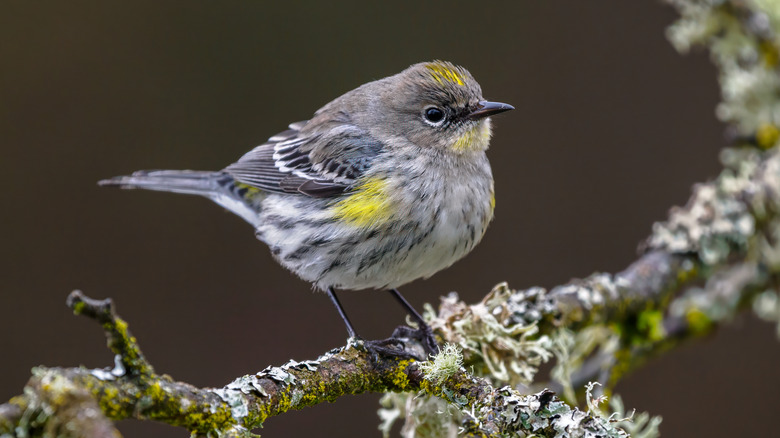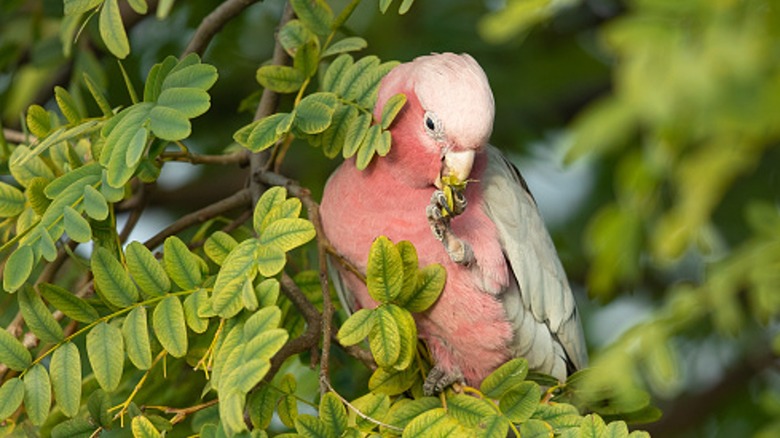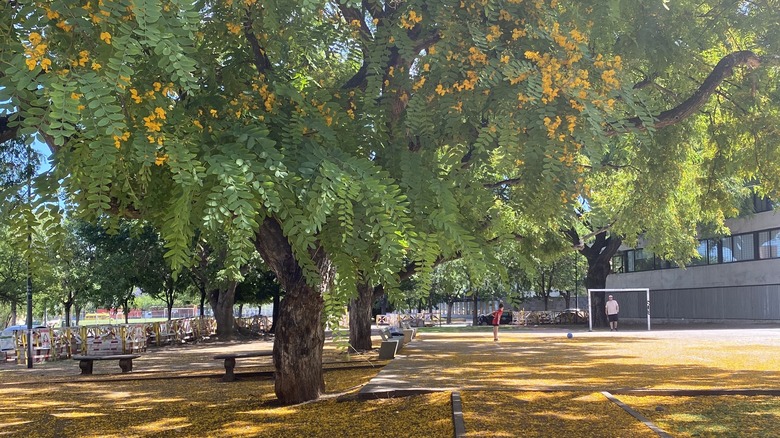The Yellow-Blooming Tree That Provides Nesting Birds With Food & Shelter
The types of trees you have growing in your yard may have a big influence on which birds decide to land during migration, feed there for a while, or build a nest for a long-term stay. Much like humans, many nesting birds want a home that feels safe, quiet, and secure but also offers nearby access to food and other resources. If you're looking for fruit and berry trees to grow in your yard that birds will love, the tipu tree (Tipuana tipu) is a beautiful and unique option. This tree is an all-around magnet for birds, providing a comfortable canopy for nesting and multiple food sources.
In addition to inviting a whole host of birds, the tipu tree, also known as the rosewood tree or pride of Bolivia, can also bring more beauty and function to your yard. However, for all its benefits, there are a few important factors that you'll need to consider before adding this unique specimen to your garden. Here's what you need to know about the tipu tree, what makes it so attractive to your feathered neighbors, and some tips for planting and growing this fascinating tree.
The tipu tree summons birds with food and shelter
The tipu tree is native to South America, and common throughout Argentina, Brazil, and Bolivia. It is an excellent choice for residents in hot, humid climates, and can be grown can be grown in USDA zones 9 through 11. One of the perfect plants to grow if you live in a tropical environment, the tipu tree is suitable as an accent tree or shade tree. A true stunner in any yard, it boasts pinnately compound leaves and bright yellow-orange flowers that emerge in late spring.
How can this tree help you enjoy more birds in your backyard? The tipu tree offers a lush, protective canopy that makes it an ideal nesting site. It also produces large, brown legume-like fruits in summer and fall and can be home to tipu psyllids (Platycorypha nigrivirga), insects that feed on its young leaves and branches. While they can be harmful for the tree in large numbers, these insects produce honeydew, a sugary secretion that is very attractive to birds and other wildlife. A wide variety of birds have been spotted in tipu trees hunting the insects and their honeydew, including red-eyed vireos, blackpolls, warblers, kinglets, thrushes, and more. Meanwhile, birds like cockatoos in Australia tend to enjoy the actual fruits. While you won't be seeing those specific birds in the United States, the tree fruits will still offer a potential food source if you live in a state with tropical bird species, such as Florida.
Tips for planting a tipu tree in your yard
Tipuana tipu is a relatively low-maintenance tree, but there are some tips you should know to keep it thriving in your yard. Firstly, the tipu tree needs full sun to thrive and won't do well in shady or cold environments. The tipu tree can tolerate a good range of soil conditions, from sandy soil to clay and loam. Neutral to very alkaline soil is preferable, but the tree may also tolerate some slightly acidic as well as salty conditions. It is relatively drought tolerant once established, but will benefit from deep watering about two to three times per week, especially during hot, dry summers. If tipu psyllid insects infest your tree, you can employ ladybugs or use chemical insecticides to limit their populations.
Although it isn't native to North America, the tipu tree isn't considered invasive in the United States, but it is in some other countries like South Africa and Australia. The tree produces copious helicopter-like seeds that can spread to nearby areas, so you may want to avoid planting Tipuana tipu near fences or property lines. The tipu tree can reach a height of up to 50 feet, with an impressive canopy spread and strong roots, so it's important for the tree to have plenty of room to grow. It is one of the prettiest fast-growing trees to create shade in a hot, sunny backyard, but planting it over sidewalks, seating areas, or pools could be a bad idea.


